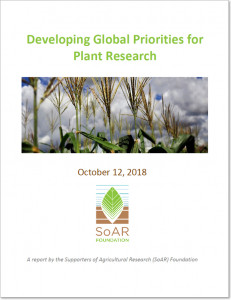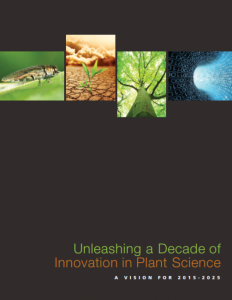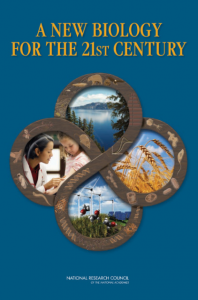Reports
-
 Developing Global Priorities for Plant Research
Developing Global Priorities for Plant ResearchSoAR released a new report entitled “Developing Global Priorities for Plant Research” on October 15th, 2018. The report presents a concise set of plant-focused research recommendations to inform the decision-making of agricultural research funders. It is the result of a series of interviews and an in-person meeting with twelve leading plant scientists from Europe, China, and the United States.
-
Science Breakthroughs to Advance Food and Agricultural Research by 2030
This report identifies innovative, emerging scientific advances for making the U.S. food and agricultural system more efficient, resilient, and sustainable. An ad hoc study committee appointed by the National Academies of Sciences, Engineering, and Medicine was guided by a Statement of Task to explore the availability of relatively new scientific developments across all disciplines that could accelerate progress toward those goals. The committee identified the most promising scientific breakthroughs that could have the greatest positive impact on food and agriculture, and that are possible to achieve in the next decade (by 2030).
-
The Challenge of Change: Harnessing University Discovery, Engagement, and Learning to Achieve Food and Nutrition Security
In 2017, the Association of Public and Land-grant Universities’ Challenge of Change Commission unveiled a report and action plan focused on harnessing the vast academic, research, and leadership capabilities of public research universities to address the interdisciplinary challenges of food and nutrition security. More information on this initiative can be found here.
-
Spurring Innovation in Food and Agriculture: A Review of the USDA Agriculture and Food Research Initiative Program
The National Academies produced a document in 2014 examining the current status of agricultural research and evaluating USDA’s premier competitive-grants program, the Agriculture and Food Research Initiative (AFRI). The study examines AFRI's role in advancing science in relation to other research and grant programs inside of USDA as well as how complementary it is to other federal research and development programs.
-
Plant Science Decadal Vision: Unleashing a Decade of Innovation in Plant Science: A vision for 2015-2025
In 2013, the American Society of Plant Biologists released its “Plant Science Decadal Vision,” a report articulating a vision intended to dramatically increase the ability of plant scientists to understand, predict, and alter plant behavior in a way that is synergistic with other national calls to address the pressing challenges facing 21st century food and agriculture.
-
Report to the President on Agricultural Preparedness and The Agricultural Research Enterprise
The President’s Council of Advisors on Science and Technology (PCAST) released a report in 2012 concluding that our food and agricultural research system is not adequately funded to meet the challenges of the 21st century. The report recommends a number of important steps, including an additional $700 million investment in agricultural research.
-
A New Biology for the 21st Century
In 2009, the National Academies released a report recommending a "New Biology" approach for finding solutions to four key societal needs: sustainable food production, ecosystem restoration, optimized biofuel production, and improvement in human health. This new approach focuses on greater integration within biology, and closer collaboration with physical, computational, and earth scientists, mathematicians and engineers.





